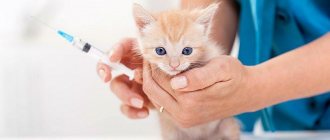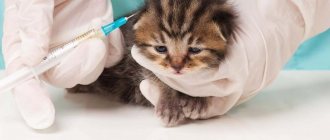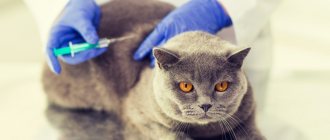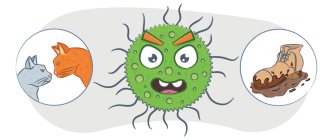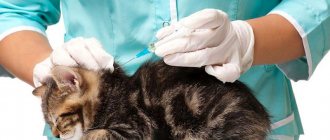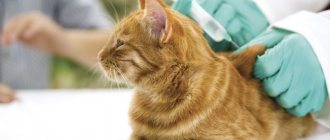Vaccination of kittens is a subject of debate for many breeders and lovers of these amazing animals. Some people are concerned about the consequences of vaccination, while others are afraid that their pet will feel unwell after the injection. Such fears are unfounded. Despite the fact that vaccinations can cause the development of temporary illness in kittens, the benefits from them will be several times greater. Experts insist on the need to introduce vaccines into the body of kittens and adult cats, since this is what will prevent complex infections in them and even save lives.
Should a kitten be vaccinated: pros and cons of vaccination
Many kitten breeders are convinced that if their pet lives in an apartment or private house, does not go outside and does not have contact with other animals, then there is no need to vaccinate. Is it really? It is important to understand that not only a street kitten, but also a domestic kitten can become infected with infectious diseases. This can happen under the following circumstances:
- through objects brought in from the street, human shoes, which may contain pathogenic microorganisms;
- owner's dirty hands;
- grass that a person will bring to a kitten from the street;
- in the veterinary clinic during the examination.
There are many risks of kittens contracting dangerous diseases, so it is better to prevent them in a timely manner. Among the positive aspects of vaccination are:
- creating a reliable immune response in the kitten’s body;
- the ability to freely take your pet outside the country;
- a necessary condition for participation in exhibitions;
- compliance with the rules of breeding purebred cats;
- protection of the offspring of vaccinated kittens in the first months after birth;
- the opportunity to let the kitten outside, walk with it in the park, at the dacha.
What are the disadvantages of vaccination? These include unnecessary financial expenses and the likelihood of your pet developing post-vaccination complications.
Cost of vaccinations for kittens and cats. Vaccine prices
How much does vaccination cost for cats and kittens? — Vaccination usually consists of the following prices:
- price of a veterinarian's work (preliminary examination, vaccination)
- the cost of the vaccine itself
- cost of veterinary passport
How much does it cost to get vaccinated? – Naturally, it’s different in every clinic. There are those who even provide vaccination for free, and there are those where the cost is close to the cost of the vaccine itself. Therefore, we will not dwell on this issue, because everyone can check the price in the clinic they are interested in.
Cost of vaccinations We will look at the average cost of comprehensive vaccinations, as well as rabies vaccinations. The remaining vaccines are very individual, and their price can be found directly at the veterinary clinic. We give the average cost in US dollars
Cost of comprehensive vaccination for a cat
| Complex vaccination | Price | Revaccination after 21 days (re-vaccination with this vaccine) |
| Felovax, USA | 12$ | + |
| Multifel (Russia) | 5$ | + |
| Nobivac FORCAT, Netherlands | 10$ | + |
| Purevax RCPCh, France | 13$ | + |
| Quadricat, France | 16$ | need not |
| Leucoriphenin | 8$ | + |
| Nobivac Triquet, Netherlands | 11$ | + |
| Felocel CVR, USA | 9$ | + |
| Purevax, France | 11$ | + |
Cost of rabies vaccination for a cat
| Rabies, do not vaccinate again | Cost of separate rabies vaccination |
| Nobivac rabies, Netherlands | 3$ |
| Rabizin, France | 2,5$ |
What vaccinations should indoor and outdoor cats have?
Veterinarians advise both indoor and outdoor kittens to be given a number of vaccines; they will protect against most known diseases. Some of them must be done, others can be done at will. Study carefully and decide which vaccinations your pet needs.
Table 1. Vaccinations for adult cats and kittens
| Disease | Necessity | Symptoms of diseases | Methods of infection |
| Panleukopenia (parvivirus enteritis, plague) | Mandatory | A contagious viral disease with a severe course, which is often fatal. The pathological process is characterized by a sharp decrease in leukocytes in the blood and a critical deterioration in the condition of the immune system. | An animal can become infected everywhere, picking up the infection on the street or in the home, where it was brought along with shoes or on clothes. |
| Rhinotracheitis | Mandatory | A disease of viral etiology that affects the mucous membranes of the respiratory organs, characterized by a high mortality rate. | Airborne, contact |
| Calicivirus | Mandatory | Damage to the respiratory system, eyes and nasal passages. Leads to the development of lameness. | Airborne, household |
| Rabies | Only for animals traveling abroad | A gross disruption of the functionality of the nervous system, which in 100% of clinical cases ends in the death of the animal. | Through the saliva of an infected animal, during a bite. |
| Viral feline leukemia | Recommended | Marked decrease in immune function with disruption of the formation of all blood cells, development of malignant tumors of the lymphatic sphere and bone marrow | Intrauterine infection, through saliva, through sexual contact. |
| Chlamydia | For mating and breeding cats | Damage to the genital organs and intestines, as well as conjunctivitis and inflammation of the nasal mucosa | Through direct contact with an infected animal. |
| Infectious peritonitis | Recommended | Infection of the small intestine and peritoneum with the development of symptoms of inflammation | Fecal-oral route |
| Microsporia | Recommended | The appearance of pathological formations on the skin, which are accompanied by itching, peeling, hair loss and damage to the structure of the claws | Contact and household transmission route |
| Feline AIDS | If you stay only at home, infection is unlikely. Walking freely on the street is a must! | Suppression of natural immunity with the formation of its deficiency | Oral route through ingestion of contaminated meat |
How to vaccinate adult cats
If for some reason the animal was not vaccinated at kitten age or it is not possible to determine when the vaccinations were given, the schedule and timing of vaccination are determined by the veterinarian.
Adult cats are vaccinated against the same diseases as kittens. The only peculiarity is that the vaccine is administered once, without duplicating it after several weeks. The immunity of adult cats is already formed, so one injection is enough. Revaccination is carried out annually.
Rules for vaccination of adult cats
- Only healthy animals are vaccinated.
- Pregnant and lactating cats are prohibited from receiving “live” vaccines.
- 10-14 days before vaccination, the animal must be dewormed and treated for fleas.
- Unvaccinated pets are not allowed to breed. If the annual vaccination period has expired, it is imperative to vaccinate both the cat and the cat a month before the planned mating.
- It is forbidden to vaccinate cats that have recently undergone surgery or those who will undergo surgery in the next 30 days.
Important!
Animals that have undergone antibiotic treatment are vaccinated 2-3 weeks after the end of antibiotic therapy.
When to get your first vaccination
The first vaccination for small kittens is given at the age of two months. This is the optimal period when maternal immunity ceases to operate and the little tomboy’s body is already strong enough to form vaccine protection. It is not advisable to vaccinate a kitten yourself. This should be done by a specialist. After the injection, information about the date of vaccination, type of vaccine, series and dose will have to be entered into the animal’s special vaccination certificate.
The first immunization allows you to inoculate the kitten with immunity against several infections, in particular, calicivirus, parvovirus enteritis or canine distemper, and rhinotracheitis. He needs a second injection of the vaccine, which is carried out 7 and 21 days after the initial injection.
Rabies vaccination: when to do?
Rabies is one of the most dangerous diseases, the pathogens of which can affect the body of most animals, as well as humans. This is a deadly infection that does not give living creatures a chance to survive. The only protection against a fatal outcome is timely prevention of pathology, that is, vaccination against rabies.
Read. Anthelmintic for dogs before vaccination: rules and recommendations
The rabies vaccine is one of the rather aggressive immune preparations. In the first days after the injection, vaccinated animals may feel general discomfort, their appetite worsens, and malaise appears. If your pet has such symptoms, then this is not a reason for concern, since after a couple of days they disappear without a trace, leaving no consequences. If you see that your pet continues to be lethargic, you need to consult a doctor.
Vaccination to prevent the disease is carried out for growing kittens who have reached 3 months of age, as well as for adult cats. It is recommended to administer the vaccine annually (some rabies vaccinations allow you to develop immunity for three years).
Without what vaccinations will a cat not be allowed abroad?
Owners will not be allowed to transport a cat across state borders without mandatory vaccinations:
- from rabies;
- viral leukemia;
- panleukopenia;
- viral nature of immunodeficiency;
- rhinotracheitis;
- calcivirosis;
- infectious peritonitis;
- mycosis.
A kitten and any other animal must have an initial rabies vaccination one month before departure on a trip.
Important! The disease called “panleukopenia” has a popular name – “distemper”.
How to prepare an animal for vaccination?
Before vaccination, kittens need special training. It includes several important points:
- deworming – expulsion of worms;
- prevention of parasitic infections;
- examination of the animal immediately before administration of the drug.
Kittens are dewormed one and a half weeks before the first vaccination. To do this, it is better to use anthelmintic drugs in tablet form or in the form of syrup, in particular, Febtal, Dirofen, Prazitel, Panacur, Pirantel. Getting rid of intestinal parasites promotes better absorption of the vaccine and the development of lasting immunity. Before revaccination, deworming will not be necessary. It is recommended that adult pets undergo deworming one and a half weeks before each vaccination.
As you know, fleas and ticks greatly weaken the immune system of animals. Therefore, before vaccination, prevention of such diseases should be carried out so that the body has the opportunity to develop adequate reactivity to infectious diseases.
An important part of preparing for immunization is examining your pet immediately before the injection. Such an event is carried out by a qualified specialist, he assesses the general health of his patient, measures his body temperature, makes sure that the kitten does not have pathological discharge from the nose, eyes, etc.
WHEN DO KITTENS GET THE FIRST Vaccination? AT WHAT AGE?
It is recommended to do the first vaccination no earlier than 2 months. At this age, it is quite easily tolerated and well absorbed. If we are talking about professional nurseries that care about the health of babies, then at 3 months they move to a new home. And decent breeders try to fully vaccinate kittens by this age (i.e., at 2 months, the first vaccination, and then again after 21 days). Also, along with revaccination with a complex vaccination, an additional rabies vaccination is often given.
How to prepare a cat, cat, kitten for vaccination
Preparation for vaccination, whether for a kitten or an adult cat, begins with deworming (getting rid of worms).
Deworming
For kittens and adult animals, deworming is carried out with some special features.
Kittens
Exactly 10 days before the first vaccination, we give the kitten an anti-worm tablet/paste/syrup. This is done to develop stronger immunity with the introduction of a vaccine. Most often, preference is given to tablets, since they are easier to get the kitten to eat. You can simply stir it with food or pour it into your mouth. If it is syrup or paste, it is easier to dose (calculated by weight). However, when the kitten realizes that liquid has been forcefully poured into its mouth, it tries with all its might to spit it all out, running around the house, shaking its head and drooling.
It is best to throw your head back and hold it like that for a while.
Before re-vaccination (re-vaccination), it is not necessary to repeat the deworming.
Here are some recommended drugs for worms: Dirofen, Febtal, Panacur, Polyvercan, Profender (single dose), Kanikvantel, Trontsil K, Prazitel, Pirantel (safe drug, does not cause intoxication).
Adult cats and kittens
Before vaccination, adult cats also undergo deworming 10 days before vaccination, regardless of when it was done previously. If the cat has not been vaccinated before, this should be done before the first vaccination. Before re-vaccination (re-vaccination), it is not necessary to repeat the deworming.
Prevention of parasites
It is also advisable to take prophylaxis against parasites (fleas, ticks, etc.) before vaccination (at least a week in advance), since they also weaken the body. Kittens can be washed with a special shampoo, and adult animals can be given drops on the withers (sold at a veterinary pharmacy).
Examination on the day of vaccination
On the day of vaccination, the kitten, cat or female cat must be completely healthy! There should be no signs of lethargy, drowsiness, or poor appetite. Immediately before administering the vaccine, the veterinarian must measure the animal’s temperature (in a healthy state it ranges from 38 to 39 degrees), examine the eyes, nose, mouth, teeth, ears, and mucous membranes for the absence of diseases. The kitten's internal organs are also palpated.
Post-vaccination period
After vaccination, the animal should not be subjected to stress, heavy physical activity, or taken outside the home/apartment. Most likely, immediately after vaccination, kittens and cats will sleep and behave rather sluggishly - this is a normal state. You don’t need to do anything, it goes away within a day, often in a few hours.
The only thing you should do is watch the animal for a while. Unfortunately, isolated cases of anaphylactic shock (allergic reaction) occur, in which the larynx swells and the kitten begins to have difficulty breathing. In this case, contact your veterinarian immediately!
Vaccination schedule: what vaccinations are given and when?
Representatives of the cat family have their own vaccination schedule, according to which veterinarians advise vaccinating them. The first vaccination is administered to a kitten at the age of 2 months and provides the animal with the formation of comprehensive immune protection against panleukopenia (distemper), calicivirosis, and rhinotracheitis. He needs a two-time revaccination, which is done a week and a month after the first injection.
You should definitely vaccinate your kitten against rabies. Modern vaccinations allow this to be done together with the third complex revaccination or independently when the kitten reaches three months of age. The vaccination schedule for adult felines is as follows. A comprehensive rabies vaccination and injection is administered once a year, annually. Table3. Vaccinations by age
Approximate vaccination schedule for cats (tabular chart):
The table is not displayed when the smartphone is held vertically, as it does not fit into the screen dimensions. Turn your device on its side.
| Vaccine names | Disease | Recommended pet age (weeks) | Revaccination (weeks) |
| Nobivak Triket | Rhinotracheitis, calcivirosis, panleukopenia | 8-12 | 3-4 |
| Nobivac Rabies | Rabies | 12 | Not required |
| Quadricate | Rhinotracheitis, rabies, calcivirosis, panleukopenia | 12 | 3-4 |
| Eurifel | Leukemia, viral rhinotracheitis, panleukopenia, calcivirosis | 7 | 3-4 |
| Leucoriphenin | Rhinotracheitis, calcivirosis, panleukopenia, chlamydia | 7-8 | 3-4 |
| Multifel 4 | Rhinotracheitis, calcivirosis, panleukopenia, chlamydia | 8-10 | 3-4 |
| Felovax | Rhinotracheitis, calcivirosis, panleukopenia, chlamydia | 8-10 | 3-4 |
| Vitafelvac | Rhinotracheitis, calcivirosis, panleukopenia, chlamydia | 8-10 | 3-4 |
| Primucel FTP | Feline viral peritonitis | 16 | 3-4 |
| Vakderm F | Microsporia, trichophytosis | 6 | 1-2 |
| Microderm | Microsporia, trichophytosis | 6-8 | 2-3 |
| Polivac | Microsporia, trichophytosis | 10-12 | 4-5 |
Where can you get vaccinated?
Currently, almost every private and public veterinary clinic provides kitten vaccination services. But who is better to trust? Most kitten breeders prefer private specialists, and there are good reasons for this.
It is believed that paid offices are cleaner. Although such a judgment is subjective. In addition, private veterinarians purchase more expensive vaccine preparations, devote more time to preliminary examination of the furry patient, as well as advice regarding the post-vaccination period and care of the kitten. If you have the financial opportunity, it is better to do it for a fee.
The most responsible cat owners prefer to vaccinate their pets at home. To do this, they call a doctor at home. Indeed, this method of vaccination is the safest; the pet is protected from contact with sick animals and is not exposed to the stressful situation associated with traveling in transport. The only negative is that such a technique will require considerable material investment.
Read. At what age should Scottish Fold kittens be vaccinated for the first time?
